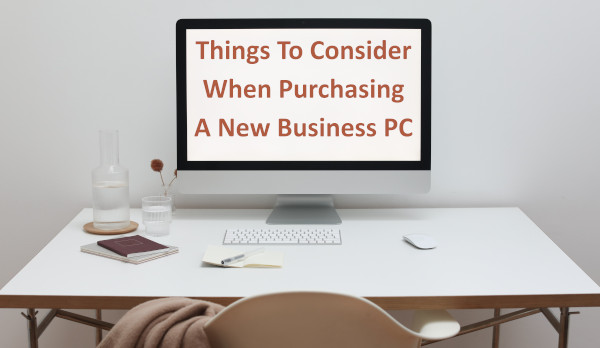Have you ever bought something and then had buyer’s remorse a few months later? The same can happen when purchasing anew computer for your business.
An investment in one or more new computers is not something you want to do lightly. Doing your research ahead of time and consulting with a trusted friend or IT consultant can help you from making major mistakes that could come back to haunt you later.
Here are several things to consider before you purchase your next computer system:
1. Purchase a Business Grade Machine
Plenty of small businesses try and save money by buying a consumer grade PC, but this could end up costing you more in the long run. Some of the benefits of are:
-
- Business grade PCs are designed for continuous usage.
- Consumer PC’s often lack certain types of firmware security present in business-use models.
- Business PC’s come with Windows Pro edition (instead of Home edition). The Pro edition is needed to connect to certain networks and comes complete with features needed for businesses.
- They come with better quality components.
- 2- or 3-year warranty comes with most business computers rather than the standard 1 year.
- The price gap has also shortened between good consumer computers and business versions. If you are not looking at the cheap systems, you will find that it does not cost much more to get a business-grade device.
2. The Amount of RAM / Memory
One big mistake that people make when purchasing a new computer is to ignore the RAM (Random Access Memory). If your system has low memory, you may run into all sorts of problems, including:
These issues can include:
-
- Slow response when booting and using the system.
- Browser freezing up when you have too many programs and / or tabs open.
- Programs not working correctly
- The system regularly freezing,
Memory is the main area the computer uses to process information. If there is not enough memory, the computer may have to wait for another program to release memory before it can continue. This can cause frustration and ruin your productivity.
The higher the RAM, the more responsive the system performance. For basic office use you need at least 8GB of RAM and if you do any graphics/video or other processing-intensive activities we recommend at least 16G.
3. The Internal Processor
Knowing what processor (AKA CPU) is best for your usage can be very confusing. How do you know if Intel Core i3, i5 or i7 is best for your needs? What is the difference between AMD and Intel processors?
To make things simpler, I relate the Intel Core CPU’s to car engines. All engines take you to the same destination, but some will get you there faster than the others. An i3 can be thought of as a 4-cylinder engine, an i5 a 6-cylinder and the i7 is a V8!
4. Hard Drive Type
For all new computers, you should get one with a solid-state drive (SSD) rather than a traditional hard disk drive (HDD). SSDs have no moving parts and are faster, less likely to have issues and are quieter. The do cost more than a tradition HDD, but if price is an issue, you can purchase PC’s with both a hard drive (for file storage) and a SSD (for the operating system and applications).
5. Storage Capacity
If you buy a computer without paying attention to hard drive space, you could regret it as you may not be able to transfer over all your data from the old computer.
Also don’t be fooled for thinking that a computer with a larger storage capacity is better than one with a lower capacity as one may be using a HDD (cheaper) rather than the faster SSD (more expensive)- see section 4 above. Purchase a computer with a SSD with the space you need or a combination of both.
6. For Laptops: The Case Type
If you are after looking for a laptop computer, it is very important that it is durable and will withstand your normal usage. For example, cheap system may not be able to cope with minor bumps, the screens hinges may fail or keys come off the keyboard. You need to consider the materials used for the case and paying extra for a better casing is definitely worth it.
Come to Us Before You Spend Money on a New Computer
Don’t blindly invest in a new computer without some expert guidance. Contact us today for a free consultation to save you from a bad new PC experience.

